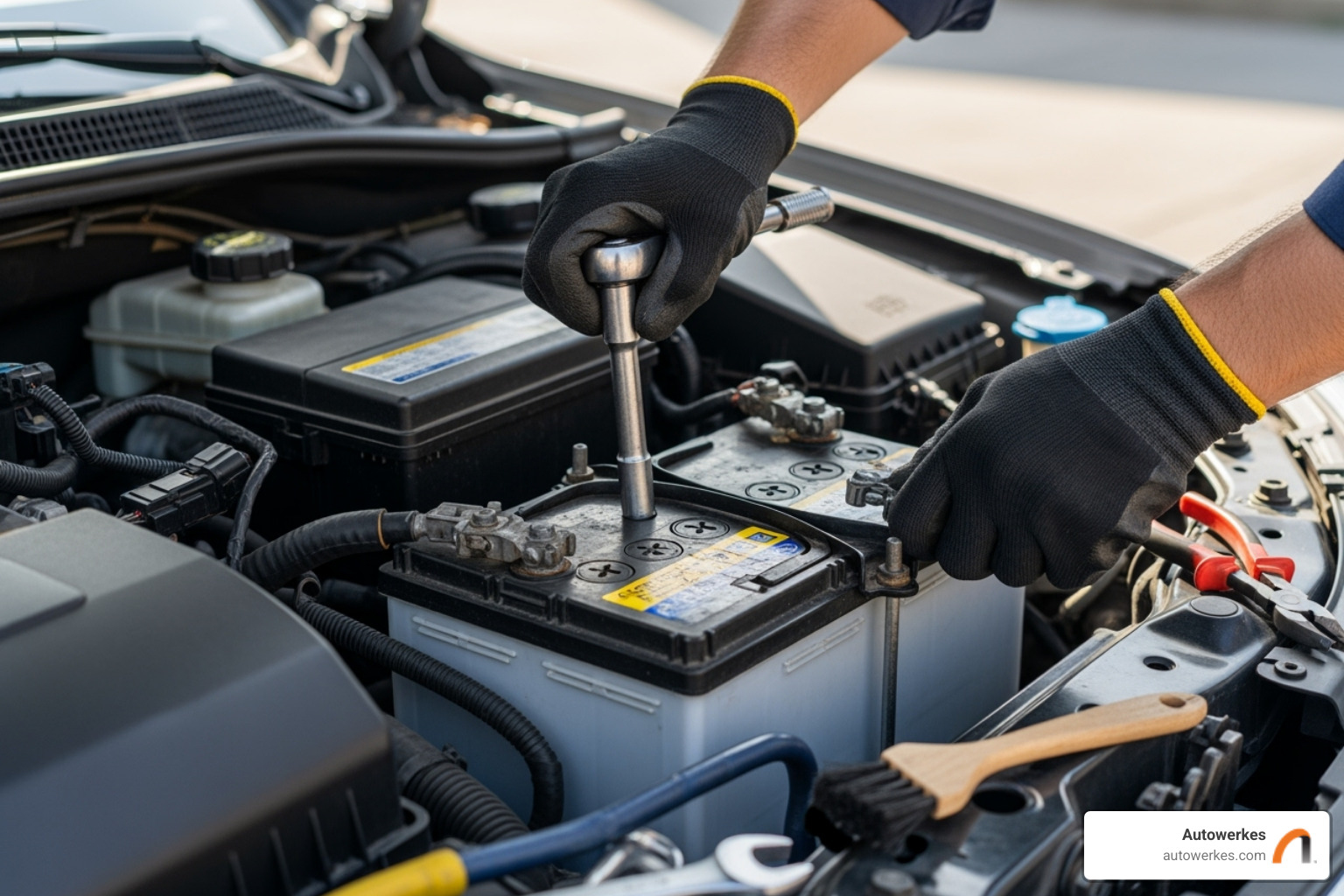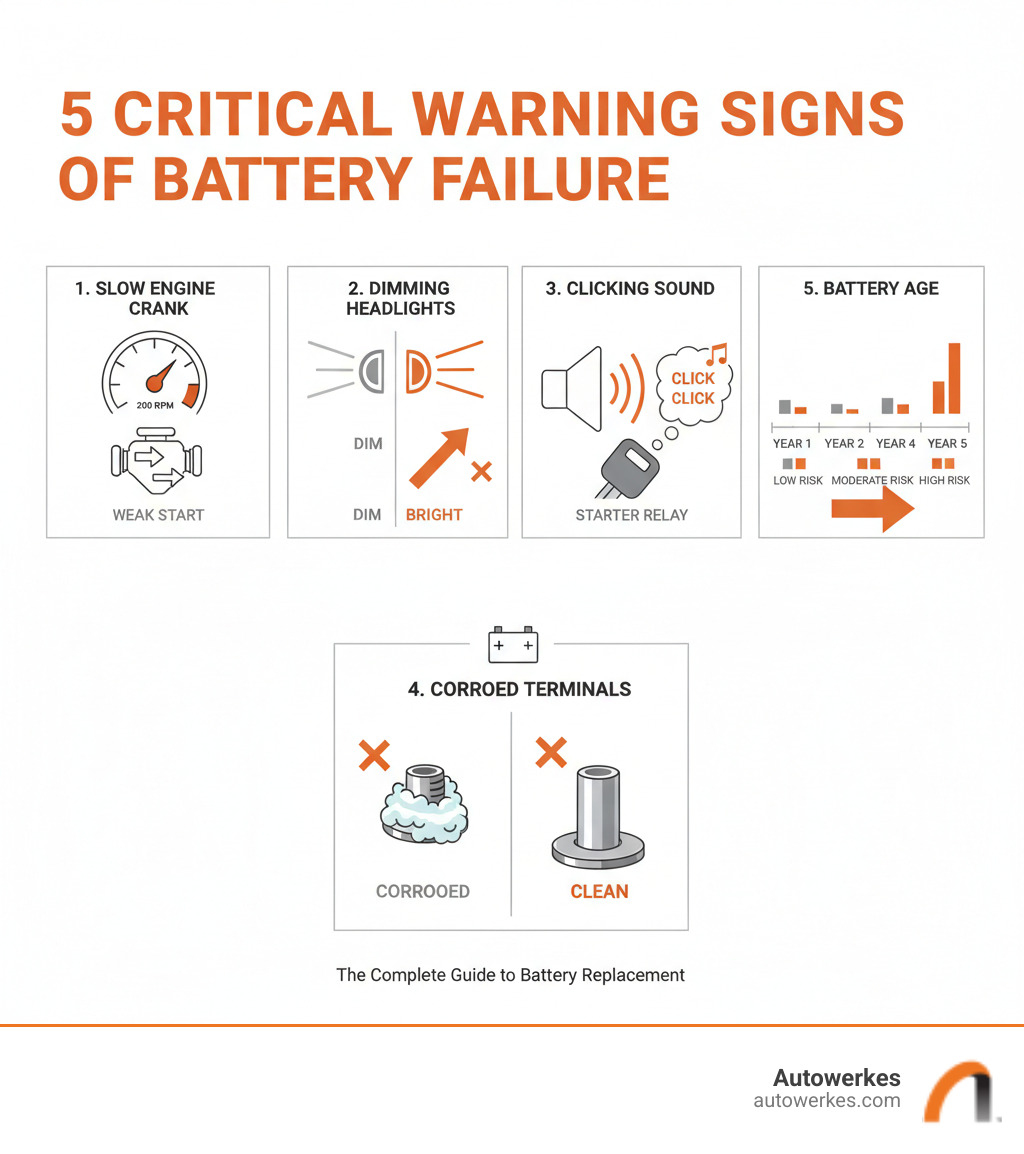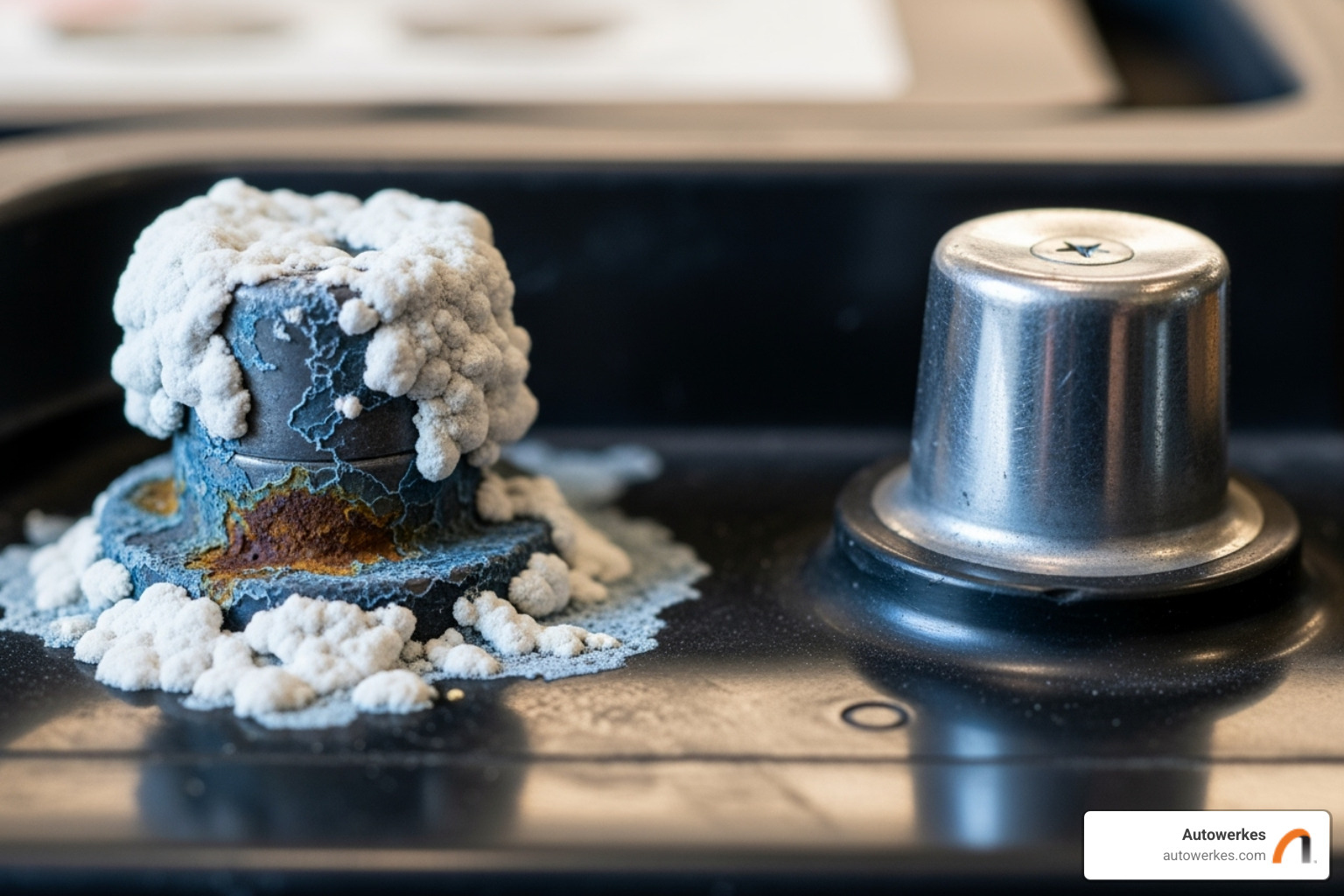The Complete Guide to Battery Replacement

Why Your Car's Battery Health Matters More Than You Think
Battery replacement becomes a critical concern when you're stranded in a parking lot at 7:45 AM, turning your key only to hear nothing but silence. Most car batteries last between 3 to 5 years, but they rarely give you much warning before they fail completely.
Key Signs You Need Battery Replacement:
- Slow engine crank when starting
- Dimming headlights and interior lights
- Clicking sound when turning the key
- Corroded terminals with white or blue buildup
- Battery is 4+ years old
- Check engine light appears on dashboard
Your car's battery does more than just start the engine - it powers every electrical component from your headlights to your advanced infotainment system. In luxury vehicles like Porsche, BMW, and Mercedes-Benz, a failing battery can trigger complex electrical issues that affect everything from memory seats to navigation systems.
Modern batteries are designed to work right up until they fail, offering little warning. This is especially problematic for luxury vehicle owners who depend on their cars' sophisticated electronics and can't afford unexpected breakdowns.
Understanding when and how to replace your battery - whether through professional service or DIY methods - can save you from inconvenient failures and potentially expensive electrical damage. The key is recognizing the warning signs before you're left stranded.

The Ultimate Guide to Car Battery Replacement
Picture this: you're running late for an important meeting, you turn the key in your luxury BMW, and... nothing. Just silence. Your heart sinks as you realize your battery replacement day has arrived whether you planned for it or not.
For owners of high-end vehicles like Porsche, BMW, Mercedes-Benz, and Mini, understanding battery replacement isn't just about avoiding inconvenience - it's about protecting the sophisticated electrical systems that make your car special. Let's walk through everything you need to know to keep your vehicle reliably powered and running smoothly.
Signs Your Battery is Failing and Its Typical Lifespan
Most of us have been there before - that moment when you press the start button and instead of your engine's familiar purr, you hear a sluggish grinding sound or that dreaded clicking noise. This "click of doom" tells you that your battery has just enough juice to engage the starter solenoid but lacks the power to actually turn your engine over.
But your battery often gives you subtle warnings before it completely gives up. Slow engine cranking is usually the first sign, especially on chilly mornings when your battery has to work harder. If your engine takes longer than usual to turn over, your battery's cranking power is probably fading.
Dimming headlights or flickering dashboard lights before you start the engine are another telltale sign. Once your alternator kicks in after startup, these lights might brighten again, highlighting just how weak your battery has become. It's like your car is telling you, "I'm struggling here!"

Corroded battery terminals - that white, blue, or greenish powdery buildup where your cables connect - can seriously impact your battery's performance. While you can sometimes clean this corrosion, it's often a symptom that your battery is nearing retirement age.
If your battery case appears swollen or bulging, especially on the sides, this is serious business. This usually happens from extreme heat or overcharging and means you need immediate battery replacement. Don't wait on this one.
Modern cars are pretty smart, and sometimes your check engine light or battery warning light will illuminate when your battery voltage drops too low. Your car's computer is essentially saying, "Houston, we have a power problem."
Battery age is perhaps the most reliable predictor of failure. Most car batteries last between three to five years, but after four years, you're living on borrowed time. If your battery has celebrated its fifth birthday, it's definitely time to start shopping for a replacement.
Several factors affect how long your battery will actually last. Extreme temperatures are battery killers - scorching heat speeds up the chemical breakdown inside your battery, while freezing cold demands more cranking power from an already weakened battery. Your driving habits matter too. Frequent short trips don't give your alternator enough time to fully recharge your battery, while the high electrical demands of luxury vehicles - with their GPS systems, heated seats, premium sound systems, and countless sensors - put extra stress on your battery.
Recognizing these warning signs helps you plan for battery replacement before you're stranded somewhere inconvenient. Our team at Autowerkes Services can help you assess your battery's health and plan the perfect replacement timing.
Understanding Battery Basics and Your Car's Electrical System
Think of your car's automotive battery as the heart of your vehicle's electrical system. It's an electrochemical powerhouse that stores chemical energy and converts it to electrical energy when you need it. Inside your battery, chemical reactions create a buildup of electrons at the negative terminal. When you turn your key or press that start button, these electrons flow from negative to positive, creating the electrical current that brings your engine to life.
Your battery's main job is powering that initial engine crank, but once your engine starts, the alternator takes over. The alternator is like your car's personal power plant - it generates electricity to run all your car's systems while you're driving and recharges your battery for the next startup. It's a beautiful partnership: your battery gets things started, and your alternator keeps everything running.
Choosing the right battery type is crucial, especially for luxury vehicles. Traditional flooded lead-acid batteries are the most affordable option, but they require maintenance and don't handle vibration well. Improved Flooded Batteries (EFB) are a step up, designed for vehicles with basic start-stop systems and offering better durability.
Absorbent Glass Mat (AGM) batteries are the premium choice and often the original equipment in luxury vehicles. These sealed, maintenance-free batteries absorb their electrolyte into fiberglass mats, making them completely spill-proof and incredibly resistant to vibration. They charge faster, last longer, and handle extreme temperatures better than other types. For vehicles with sophisticated electronics and start-stop technology, AGM batteries are often not just preferred - they're required. For more background on the chemistry and design, see Absorbent glass mat.
When it comes to BMW battery replacement, precision matters. BMW's complex electrical systems require specific battery types and proper installation to avoid triggering error codes or affecting performance. Our experts understand these requirements inside and out. Learn more about our specialized BMW Auto Repair services.
Mercedes-Benz vehicles are equally demanding when it comes to battery replacement. Using the wrong battery can cause a cascade of electrical issues that are both frustrating and expensive. We use genuine or OEM-equivalent batteries and follow manufacturer specifications for every Mercedes model. Check out our dedicated Mercedes-Benz Auto Repair services.
The Cost and Process of Battery Replacement
Battery replacement costs vary significantly based on several key factors, and understanding these can help you budget appropriately and make informed decisions about your vehicle's needs.
Battery type is the biggest cost driver. Standard flooded batteries are typically the most budget-friendly option, while EFB batteries fall in the middle price range. AGM batteries, which are often required for luxury vehicles with advanced electrical systems, represent the premium end of the market. The sophisticated technology and superior performance of AGM batteries justify their higher cost, especially when you consider the expensive electronics they're protecting.
Your vehicle's specific requirements also influence cost. Some luxury cars need high-capacity batteries with specific dimensions and cold-cranking amp ratings. Additionally, certain models have batteries located in challenging spots - like under the rear seat or in the trunk - which can increase labor time and complexity.
Professional installation costs cover much more than just swapping batteries. Our certified technicians perform comprehensive testing, safely remove your old battery, install the new one with proper torque specifications, and handle environmentally responsible disposal. For luxury vehicles, this often includes crucial steps like battery registration, which we'll discuss shortly.
You'll also encounter a core deposit when purchasing a new battery. This refundable charge encourages you to return your old battery for proper recycling. Once you bring back your spent battery, you get this deposit refunded. It's an important environmental program, as car batteries contain hazardous materials like lead and sulfuric acid that must be handled responsibly according to guidelines from agencies like the U.S. Environmental Protection Agency (EPA).
When it comes to repair versus replacement, car batteries are pretty much all-or-nothing components. Unlike other car parts that can be fixed, a failing battery needs to be replaced. While you might temporarily revive a dead battery with a jump-start or improve performance by cleaning corroded terminals, these are temporary measures. Once a battery's internal chemistry degrades, battery replacement is your only reliable solution.
For Porsche battery replacement, precision is essential to maintain your vehicle's sophisticated power management systems and prevent error codes. Our factory-trained technicians understand the specific requirements of every Porsche model. Explore our expert Porsche Auto Repair services.
Even compact Mini vehicles have specific battery requirements that must be met during replacement. Using incorrect voltage or amperage specifications can affect various electrical components and system performance. We ensure your Mini receives exactly the right battery with proper installation procedures. Learn more about our Mini Auto Repair services.
DIY vs. Professional Service for Battery Replacement
The question of whether to tackle battery replacement yourself or leave it to professionals is more complex than you might think, especially when luxury vehicles are involved. While changing a battery might seem straightforward, modern high-end cars present unique challenges that make professional service highly recommended.
| Consideration | DIY Battery Replacement | Professional Service |
|---|---|---|
| Cost | Lower upfront cost, but potential for expensive mistakes | Higher initial investment, but comprehensive service and warranty protection |
| Safety | Risk of acid spills, electrical shock, and improper handling of heavy batteries | Professional safety protocols, proper protective equipment, and trained handling |
| Tools Required | Basic tools may not be sufficient; specialty tools often needed for luxury vehicles | Complete professional toolkit including diagnostic equipment and battery registration tools |
| Technical Knowledge | Risk of incorrect installation, improper torque specs, and missing crucial steps | Expert knowledge of vehicle-specific requirements and manufacturer procedures |
| Battery Registration | Often overlooked or impossible without professional diagnostic tools | Proper registration ensures optimal charging and prevents premature failure |
| Warranty | Limited battery-only warranty with potential voids from improper installation | Comprehensive service warranty covering both parts and labor |
| Time Investment | Can take hours if complications arise or special access is required | Efficient professional service typically completed in 30-60 minutes |
| Diagnostic Testing | No ability to test charging system or identify underlying electrical issues | Complete electrical system analysis to prevent future problems |
DIY risks extend beyond just getting your hands dirty. Battery acid is highly corrosive and can cause serious burns or damage to your vehicle's paint and components. Electrical damage from improper connections can fry expensive control modules, and the heavy weight of car batteries (often 40-60 pounds) creates injury risks during handling.
Perhaps most importantly for luxury vehicle owners, many modern cars require battery registration - a process where the vehicle's computer system is informed about the new battery's specifications. This allows the charging system to optimize its output for the specific battery type and capacity. Without proper registration, your new battery may not charge correctly, leading to premature failure and potential electrical system issues.
Professional benefits go far beyond just installation. Our certified technicians bring proper safety equipment, specialized tools, and comprehensive knowledge of vehicle-specific requirements. We perform complete electrical system diagnostics to identify any underlying issues that might have contributed to battery failure, ensuring you don't face repeat problems.
Professional service also includes proper environmental disposal of your old battery and often comes with comprehensive warranties covering both parts and labor. When something goes wrong, you have recourse and support rather than being stuck troubleshooting problems on your own.
For luxury vehicles especially, professional battery replacement isn't just recommended—it's essential for maintaining your vehicle's sophisticated electrical systems and preserving your investment. If you're in the Huntington Beach area and need expert service for your Porsche, BMW, Mercedes-Benz, or Mini, trust the certified technicians at Autowerkes. Book your appointment today to ensure your vehicle receives the professional care it deserves.

.svg)




.png)